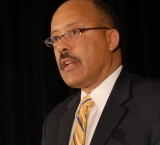The 21st Century is upon us and with it a new and growing set of challenges are in front of government leaders, private industry CEOs and NGOs. These challenges range from sustaining and optimizing the profitability of the enterprise, creating safe and productive societies for all to participate, and collaborating with other government leaders to address growing pressures on the earth brought forth due to global warming, war and societal conflict, and the general disregard and respect for one another.
If we are to coexist and create lasting societies in the 21st century, leaders must consider the diversity of the human species across the planet. Understanding, appreciating and building societies that are respectful, inclusive, and collaborative will require that we deepen our understanding of each other going forward. It also means that we must insure that all are at the table in decision-making.
Diversity as a concept means the richness we all bring to the table. This diversity considers our racial, ethnic, gender, style, national origin, sexual orientation and identity, and language, cultural backgrounds among other attributes in helping solve pressing organizational and societal issues.
At its core is the concept of inclusion which focuses on how we make this diversity work for the greater good of society and the communities within which we live. It also means that for organizations to be effective and to optimize their outputs, the engagement, involvement and integration of these diverse points of view is critical.
Diversity as an integral part of corporate strategy has evolved over the past forty years. Much of its early emphasis on compliance oriented and grounded in U.S laws outlawing discrimination in employment.[1] The principle was one of providing every one with an equal opportunity[2] to be hired and to be promoted in the work place.
This is an important and urgent topic. You've set a stake in the ground--now I wonder if you could flesh this out to offer up a STORY of an innovation that moves the ball forward on this topic. Have you done anything inside Weyerhauser to engage, involve, and integrate diverse points of view in a way that has fundamentally changed how people work and lead or how the organization succeeds? If this is still an evolving arena for you, could you invent a HACK (see the hacks page for more info: http://managementexchange.com/hack)—a bold new idea for tackling this challenge. If you had no limitations at all, what kind of experiment would you like to put in place?
Thanks for joining the MIX. Looking forward to hearing more from you on this topic.
- Log in to post comments
Hi Effenus:
This is good stuff. I'm actually working on an economic development intitiative with a focus on effectively interfacing a diverse group of leaders and experts from different professional backgrounds. What suggestions do you have for me in terms of your own experience regarding effectively interfacing public policy with private industry, non-profits, unions, and academia?
Thanks, Eric Schillinger
- Log in to post comments
Effenus,
Thank you for your post.
Just wondering, have you seen any negative impacts of diversity in the organization? If yes, how do you deal with them?
I just read a study published in the Academy of Management Journal claiming that people perceive a different level of customer service based on customer service rep's race and gender. How do you ensure diversity and compliance with the law while keeping customer service at the expected level?
Any ideas are much appreciated!
- Log in to post comments
Thanks for bringing this to MiX. I think Holly's suggestions would definitely be helpful. And, I'm not sure given her comments, but I think that changing the moonshot" would help and yes if you have real examples of what you're doing that would be great. So, what happens when you change the moonshot from how leaders lead [their work] to:
Who's leading and how - from the 'bottom' up [assumption is that there's more diversity the deeper you go in an organization]
or
What knowledge, skills and experience they need to demonstrate and/or they get [understanding risk social, governance and environmental] and what do we need to do to prepare them for that [leads directly to diverse voices]... or... Hope this helps.
- Log in to post comments







You need to register in order to submit a comment.